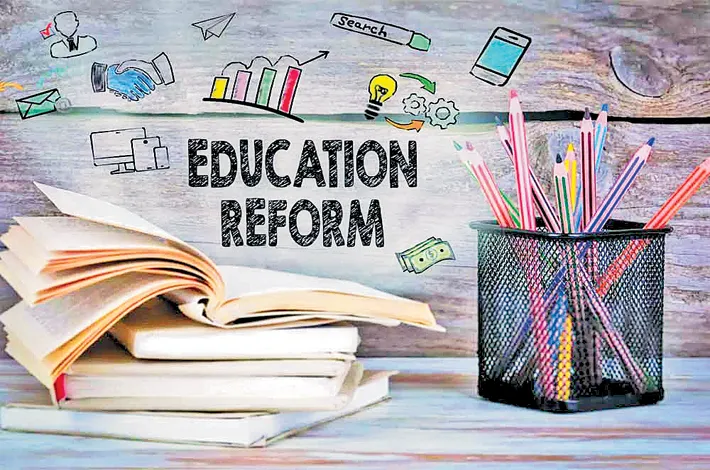Major reforms in Intermediate education on the anvil
09-01-2025 12:00:00 AM

AP Govt seeks suggestions till January 26, 2025
- ■ No first-year public examinations for Intermediate students from academic year 2025-26
- ■ Changes in Science, Arts, and Language streams text books
- ■ MPC, BiPC will be restructured to include fewer subjects with integrated content
- ■ Mathematics-A and Mathematics-B will be merged into a single subject
- ■ Botany and Zoology will combine into Biology
- ■ New combinations in Humanities will offer more flexibility, catering to diverse academic interests
Metro India News | AMARAVATI
In a landmark decision aimed at easing academic pressure on students, the Andhra Pradesh Board of Intermediate Education has proposed significant reforms in the Intermediate education system.
The board has proposed to discontinue first-year public examinations for Intermediate students starting from the academic year 2025-26, and opened to take feedback and finalise the decision, marking a shift in the state’s approach to evaluating academic performance.
Addressing a press conference on Wednesday, Dr. Kritika Shukla, Secretary of BIE stated that the proposed reforms aligns with the National Curriculum Framework Act (NCF-2023), which emphasizes a balanced, skill-oriented curriculum rather than rote learning.
She highlighted that these proposals aim to create an environment where students focus on understanding concepts rather than memorizing content.
She added, “The change of Curriculum addresses the need to reduce undue academic stress while aligning the syllabus with national standards, ensuring better preparation for competitive exams such as NEET and JEE.”
As part of this overhaul, the state proposed to implement NCERT textbooks for Intermediate students in Science, Arts, and Language streams. To ensure continuity with NCERT textbooks introduced in the 10th grade starting the 2024-25 academic year, the Board will transition intermediate students to NCERT textbooks from the 2025-26 academic year, providing students with a standardized academic foundation that mirrors national competitive exam requirements.
Upon finalising the proposals, the revised NCERT syllabus for first-year students in all subjects will be implemented in 2025-26 academic year, and full adoption of the NCERT syllabus for both first-year and second-year students will be taken up in academic year 2026-27. In fact, the current syllabus has been left unrevised for over a decade.
Under the new system, first-year public examinations will be cancelled, with individual colleges taking responsibility for internal assessments. However, second-year public examinations will continue to be conducted by the Intermediate Board to ensure consistency and credibility in certification.
“Over the years, the Intermediate syllabus in Andhra Pradesh has seen limited updates, rendering it outdated in the context of contemporary educational needs. The introduction of NCERT materials aims to bridge this gap while also addressing feedback from students, parents, and educators,” said Kritika Shukla.
Besides this, the board also proposed various other reforms including ‘Subject Combinations’, where the science streams (e.g., MPC, BiPC) will be restructured to include fewer subjects with integrated content.
For instance, Mathematics-A and Mathematics-B will be merged into a single subject and Botany and Zoology will combine into Biology. New combinations in Humanities will offer more flexibility, catering to diverse academic interests.
The proposed reforms will bring the intermediate examination structure in line with the CBSE model. ‘Practical and Internal Assessments’ where a balanced weightage system will be introduced, with 80 marks for theory and 20 marks for internal or practical assessments in subjects such as Science and Commerce. Also, students will have options to choose additional elective languages or practical subjects, enhancing interdisciplinary exposure.
With these reforms, Andhra Pradesh joins the ranks of over 15 states that have integrated NCERT-based curriculum into their education systems. By prioritizing student well-being and academic preparedness, the state aims to foster a generation of learners equipped to meet the challenges of higher education and beyond.








